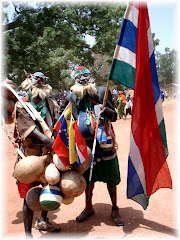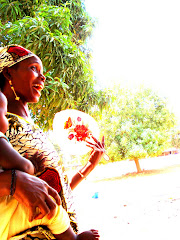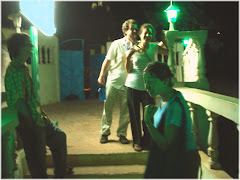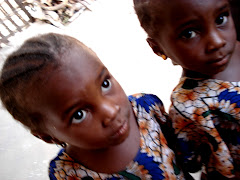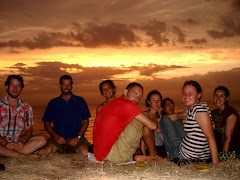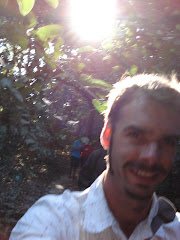 Fssst. Thump. Fssst. Thump. Laughter and fast footfalls. Ruminants gallop while boys dive. The elders assert their social standing. With each gust of wind another mango drops. First heard far away but quickly tossed from tree to tree until it tickles the branch you are poised beneath. The wind in the leaves high above finds that fruit that wasn’t quite ready with the last gust. Fssst. Thump. Necks twist and sprints are broken. Fssst. Shouts and giggles and laughter and cries of pain. Thump. The ripe fruit and a puff of dust: an orange flame in the drab dirt. The face of my Gambian village stained orange on its cheeks and chins. Stringy bits stuck between the teeth. Every hungry creature licks the lips and chases the fruit. Clouds of brown kicked up as the children race and chase for the… Fssst. Thump. Early in the morning we are called from our beds by night-cool fruits. The first afternoon breeze drops a piping hot mango pie at our feet. By the time the evening winds blow, the fruit- like us- has cooled. Fssst. It is not knowable which is the more welcome refreshment. Thump. The burst of the mango or the breeze that dropped it. Each of us is certain though that this is the sweetest bite that will come all year. Waiting for windfall mangoes.
Fssst. Thump. Fssst. Thump. Laughter and fast footfalls. Ruminants gallop while boys dive. The elders assert their social standing. With each gust of wind another mango drops. First heard far away but quickly tossed from tree to tree until it tickles the branch you are poised beneath. The wind in the leaves high above finds that fruit that wasn’t quite ready with the last gust. Fssst. Thump. Necks twist and sprints are broken. Fssst. Shouts and giggles and laughter and cries of pain. Thump. The ripe fruit and a puff of dust: an orange flame in the drab dirt. The face of my Gambian village stained orange on its cheeks and chins. Stringy bits stuck between the teeth. Every hungry creature licks the lips and chases the fruit. Clouds of brown kicked up as the children race and chase for the… Fssst. Thump. Early in the morning we are called from our beds by night-cool fruits. The first afternoon breeze drops a piping hot mango pie at our feet. By the time the evening winds blow, the fruit- like us- has cooled. Fssst. It is not knowable which is the more welcome refreshment. Thump. The burst of the mango or the breeze that dropped it. Each of us is certain though that this is the sweetest bite that will come all year. Waiting for windfall mangoes.This month brought many surprises- many treats and one minor threat.

A big congratulations is in order for my brother in Columbus, Ohio and his wife. They had their first child, a healthy baby girl named Amelie Sophia. It makes it hard to be here sometimes because I am missing some important moments in the life of my family back home. I am very happy for you Nate and Caroline.
The first rain I’ve seen in eight months came just a few days ago. I was on my bike on a windy morning about fifty kilometers from home and I was praying for rain. I had just spent the last five days on trek in Kiang with my Peace Corps friends Nick and Rob conducting beekeeping training. We rode from village to village meeting beekeepers and showing them some of the techniques we’ve been experimenting with. Mr. Bah2 from the National Beekeepe
 rs Association of The Gambia (NBAG) had set up some of the meetings. We demonstrated Kenyan Top Bar hive baiting and post-harvest wax rendering to more than thirty beekeepers. The initial results were seen when several hives that we baited were colonized within days. This is in spite of the fact that now is the beginning of the dearth period when bees are less likely to be on the lookout for a new home. Another highlight: We showed a man how to clarify his beeswax and he turned it into hand-cream and made over 500 dalasis. Also we talked with beekeepers to learn from them and I was shown a grass that is burned near hives because the smoke works as an attractant. We walked around and observed many different apiaries and helped a few people place their hives. Nick bought some woven-grass hives from a man for 100 dalasis each.
rs Association of The Gambia (NBAG) had set up some of the meetings. We demonstrated Kenyan Top Bar hive baiting and post-harvest wax rendering to more than thirty beekeepers. The initial results were seen when several hives that we baited were colonized within days. This is in spite of the fact that now is the beginning of the dearth period when bees are less likely to be on the lookout for a new home. Another highlight: We showed a man how to clarify his beeswax and he turned it into hand-cream and made over 500 dalasis. Also we talked with beekeepers to learn from them and I was shown a grass that is burned near hives because the smoke works as an attractant. We walked around and observed many different apiaries and helped a few people place their hives. Nick bought some woven-grass hives from a man for 100 dalasis each.
Finally, I had to return home but I had a bit of a coughing and wheezing thing going (seems like whenever I travel in The Gambia I hack up a lung) so I was feeling a bit slow and travel-worn. There was a headwind and sweat kept dripping from my helmet into my eyes. I was moving in slow-motion through villages, bush, and open fields. It is becoming planting time here in The Gambia and so men are slashing dried weeds and burning crab grasses. Many people are out preparing the dry rice-lands with machetes and digging sticks. A cool drop fell to my arm and I instantly registered it as something other than salty perspiration. Then another. And another. And then the electric scent captured my nose with a remembered tickle from some far-away olfactory memory. Rain was in the air. First I had felt it, then I had smelt it. Naturally I had to taste it. I stopped my bike on the red-dirt road and looked into the hazy distance. There was rain falling all around me; my clothes- which were already wet- became soaked. The wind was cooling the air and the trees were sipping from their leaves the first dusty drink of the rainy season. I did too.
It rained only about ten minutes. The road soaked up the water and left no evidence that it had ever fallen at all. I sniffed the air for every last lingering proof like the perfume of every pretty girl gone but never forgotten.
(Sorry about that. Rain and pretty girls are undeniably poetic in my world.)
 So, I was sitting on the bamboo bantaba in my compound one morning a few weeks ago talking about soldiers with my friend Sanna. Suddenly he spotted a small animal running across a burned field just beyond the village and he smiled hugely. “Laar wandu ngessa toon!” he said and I looked at the monkey over there in the field. A few days before, he had asked me if I would eat a monkey. I said that I would and told him the story about when I ate one last February that some Mandinkas had charred. He said he wouldn’t eat one because it looks too human but that if he saw one he would shoot it for me. He saw this one and was instantly calling for his mutt and racing to his house for his rifle. He was back in an instant and we went running to the chewe’ trees- chasing the dog that was chasing the monkey. We arrived at the grove and craned our necks skyward searching the canopy for the treed primate. I sent up a silent wish that somehow Sanna would miss even though I knew he wouldn’t. What was I doing? I had no right to hunt this monkey just because I’ve been eating nothing but rice for weeks. Maybe he’ll miss. A crack went out as he shot and then silence. We each breathed up into the leaves and dappled sunlight. Nothing. He must have missed. He wouldn’t miss again. The monkey lunged from one tree to the next with a graceful jump and looked down at us. My eyes locked with hers. I knew exactly what she did. There was no way out. Even if Sanna missed this time, eventually somehow she would fall. The rifle blasted and the monkey fell and the dogs lit upon her and I looked away. She was dead before she even hit the ground.
So, I was sitting on the bamboo bantaba in my compound one morning a few weeks ago talking about soldiers with my friend Sanna. Suddenly he spotted a small animal running across a burned field just beyond the village and he smiled hugely. “Laar wandu ngessa toon!” he said and I looked at the monkey over there in the field. A few days before, he had asked me if I would eat a monkey. I said that I would and told him the story about when I ate one last February that some Mandinkas had charred. He said he wouldn’t eat one because it looks too human but that if he saw one he would shoot it for me. He saw this one and was instantly calling for his mutt and racing to his house for his rifle. He was back in an instant and we went running to the chewe’ trees- chasing the dog that was chasing the monkey. We arrived at the grove and craned our necks skyward searching the canopy for the treed primate. I sent up a silent wish that somehow Sanna would miss even though I knew he wouldn’t. What was I doing? I had no right to hunt this monkey just because I’ve been eating nothing but rice for weeks. Maybe he’ll miss. A crack went out as he shot and then silence. We each breathed up into the leaves and dappled sunlight. Nothing. He must have missed. He wouldn’t miss again. The monkey lunged from one tree to the next with a graceful jump and looked down at us. My eyes locked with hers. I knew exactly what she did. There was no way out. Even if Sanna missed this time, eventually somehow she would fall. The rifle blasted and the monkey fell and the dogs lit upon her and I looked away. She was dead before she even hit the ground. 
Sanna and I took the monkey home passing through the ranks of people staring and grinning. Few people here eat monkey and I knew right away that I would be on my own with this thing. We took her home and my host-mom asked what we were going to do with it. We scared my host-sister and fascinated the children. Finally we took the carcass to my back yard and strung it from a leuceana tree. Sanna offered to skin and gut it for me since he knew that I didn’t know how. Once he was done with that though he left me on my own to cut away the meat. I worked for an hour to free the meat and I decided that I agreed with the townsfolk. Monkey looks a lot like human. But once it was finished it tasted an awful lot like beef.
 I marinated the meat in olive oil, salt, and spices for about three hours. I made a mango, onion, and tomato chutney from local ingredients. Finally, I braised the meat over an open fire and reduced the sauce until it was thick and served it over rice. My host father refused to try any at all but the rest of my family each had a few bites and told me that it was weli (sweet.)
I marinated the meat in olive oil, salt, and spices for about three hours. I made a mango, onion, and tomato chutney from local ingredients. Finally, I braised the meat over an open fire and reduced the sauce until it was thick and served it over rice. My host father refused to try any at all but the rest of my family each had a few bites and told me that it was weli (sweet.) 
The President came to town last month. He is an interesting figure. Perhaps you have heard of him. He is the man who believes that he can heal HIV/AIDS by rubbing oil on people’s bodies and has publicly said that any homosexuals found in The Gambia will be beheaded. He was making a tour of the country and stopping at various towns along the way. This man travels in style. Long, black armor-plated Hummers, military men and artillery spread out in a sea of camouflage on the road in front of and behind him. People here love their President though and so turned out en masse to dance and sing and hear the speeches. My group of beekeepers carried a KTB and a traditional grass hive up to Kalagi on a donkey cart so that we might get some exposure. Schools from all over the Fonis came, women and men who never leave the village made the trek to see the President. I got there in the morning and nobody knew when to expect him so I mingled for a while on the dusty road with clowns and school children. Some Jola women were singing and I decided to make a short video of them. (I have made a lot of videos here and will put them on YouTube so you can view them. Unfortunately, the connection is slow and uploading takes forever so I’m sending them to some friends back in New Mexico who have a fast connection. When they are up, you’ll be the first to know.) I videoed the women for a while then panned across the crowd at the Bintang Bolong bridge that the President’s parade would cross over. Instantly and before I knew what was happening a paramilitary man all in black with a hefty pistol and mean look on his face filled my viewfinder with his hand and took the camera away from me. He was manhandling it trying to turn it off while I protested. He would not give it back and threatened to throw it on the ground if I didn’t shut it down. So I asked for it so I could turn it off and then promised to put it away. He gave it to me reluctantly and informed me with the air of authority that his position had given him that cameras were prohibited when the President was around. But he wasn’t around I told him. But I was just taking some pictures of the people assembled to welcome him. “You should leave the territory.” He told me. But I was invited here and I came with friends. “If you don’t leave right now I will fuck you in the ass!” Now I was shaking and many people were watching. He grabbed my arm as I strug gled to put my camera away and he started to drag me. I wasn’t putting up much of a fight. I just kept saying “I’m Peace Corps. I live here. These are my people.” But he wasn’t hearing it. “Leave now. You are not welcome here. The President is coming and I don’t want to see you. If I see you I will beat you.” I didn’t want to go of course but I also didn’t want a beating… or anything else that he was offering. “Doubletime! I said move!” He was shoving me and marching me while all of the people of Foni Jarrol looked on and I kept wondering how this incident would affect my credibility within the community. Finally I was back in town away from the bridge and I could tell that the President had arrived because of all the cheering and the sirens. Suddenly, the paramilitary man was gone and I was trying to decide what to do. Then I saw my PC friend Nick who was passing through on his way to Kiang and got stopped for the oncoming motorcade. He could see that I was frantic and so I told him the story amidst all the revelry and commotion. Then I noticed that there was an army man directly behind me. He searched my bag and then heard my story. He said I could stay and that I shouldn’t take any more pictures. I said I wouldn’t and he disappeared into a sea of camouflage. I spoke to the local police who confirmed that I could stay and that if I had any other trouble I should come to see them.
gled to put my camera away and he started to drag me. I wasn’t putting up much of a fight. I just kept saying “I’m Peace Corps. I live here. These are my people.” But he wasn’t hearing it. “Leave now. You are not welcome here. The President is coming and I don’t want to see you. If I see you I will beat you.” I didn’t want to go of course but I also didn’t want a beating… or anything else that he was offering. “Doubletime! I said move!” He was shoving me and marching me while all of the people of Foni Jarrol looked on and I kept wondering how this incident would affect my credibility within the community. Finally I was back in town away from the bridge and I could tell that the President had arrived because of all the cheering and the sirens. Suddenly, the paramilitary man was gone and I was trying to decide what to do. Then I saw my PC friend Nick who was passing through on his way to Kiang and got stopped for the oncoming motorcade. He could see that I was frantic and so I told him the story amidst all the revelry and commotion. Then I noticed that there was an army man directly behind me. He searched my bag and then heard my story. He said I could stay and that I shouldn’t take any more pictures. I said I wouldn’t and he disappeared into a sea of camouflage. I spoke to the local police who confirmed that I could stay and that if I had any other trouble I should come to see them.
The b est part of the story is that the President saw the beehives that my friends had brought and offered to buy 300 of the grasshives. I was thrilled because it’s a great way for them to make some money. Also, only two men there know how to make them so we will have to be taught. This translates to skills transfer, income generation, and community project which are all watchwords of Peace Corps and important to me as modes of development. I am so proud to see this happening and feel like this is an important step for the Mangana Agroforestry and Beekeeping Association.
est part of the story is that the President saw the beehives that my friends had brought and offered to buy 300 of the grasshives. I was thrilled because it’s a great way for them to make some money. Also, only two men there know how to make them so we will have to be taught. This translates to skills transfer, income generation, and community project which are all watchwords of Peace Corps and important to me as modes of development. I am so proud to see this happening and feel like this is an important step for the Mangana Agroforestry and Beekeeping Association.
I found a dead donkey’s skeleton in the bush last month. I brought the sun-bleached bones home and pounded them with a large wooden mortar and pestle and then shook the dust through a screen to make bonemeal. People walking past my house came over to see what I w as doing because Gambians who pound millet everyday get a big kick out of watching toubobs try it. They had never seen such a thing and several women helped me for a while. I explained the NPK needs of plants and told them that bonemeal would add phosphorous and calcium to the soil stimulating root growth, flower development, and overall plant health. I told them that I would mix the bonemeal with wood ash (equal amounts) and then apply the blend to the soil as a plant fertilizer. Wood ash adds potash (potassium- the K in NPK) to the soil which enhances the plant’s ability to retain water, increases crop yields, and improves the plant’s resistance to disease. These will be applied to the base of the plant once it is six to eight weeks old. Prior to that, I am using human urine for the nitrogen needs of the plant for vegetative growth. Peace Corps The Gambia is promoting human urine as an organic and inexpensive fertilizer. I fill a 20 liter bidong one quarter of the way with water then pee in it until it is half full. This takes about a week. Then I top it off with more water and keep it sealed to prevent ammonia release. I leave it for one week then apply it directly to my plants for both foliar and root feeding. Chemical inputs are expensive, unavailable, and not very good for the soil. By making fertilizer from urine, bones, and ashes I am providing all the basic needs for my plants without having to resort to something I don’t want to use.
as doing because Gambians who pound millet everyday get a big kick out of watching toubobs try it. They had never seen such a thing and several women helped me for a while. I explained the NPK needs of plants and told them that bonemeal would add phosphorous and calcium to the soil stimulating root growth, flower development, and overall plant health. I told them that I would mix the bonemeal with wood ash (equal amounts) and then apply the blend to the soil as a plant fertilizer. Wood ash adds potash (potassium- the K in NPK) to the soil which enhances the plant’s ability to retain water, increases crop yields, and improves the plant’s resistance to disease. These will be applied to the base of the plant once it is six to eight weeks old. Prior to that, I am using human urine for the nitrogen needs of the plant for vegetative growth. Peace Corps The Gambia is promoting human urine as an organic and inexpensive fertilizer. I fill a 20 liter bidong one quarter of the way with water then pee in it until it is half full. This takes about a week. Then I top it off with more water and keep it sealed to prevent ammonia release. I leave it for one week then apply it directly to my plants for both foliar and root feeding. Chemical inputs are expensive, unavailable, and not very good for the soil. By making fertilizer from urine, bones, and ashes I am providing all the basic needs for my plants without having to resort to something I don’t want to use.
So I guess that’s about it. Other stuff too but as always I have to get going back to site and I am trying to get this posted before I go. I hope that you are all well. I hope that you are growing something and that it makes you happy.

 gled to put my camera away and he started to drag me. I wasn’t putting up much of a fight. I just kept saying “I’m Peace Corps. I live here. These are my people.” But he wasn’t hearing it. “Leave now. You are not welcome here. The President is coming and I don’t want to see you. If I see you I will beat you.” I didn’t want to go of course but I also didn’t want a beating… or anything else that he was offering. “Doubletime! I said move!” He was shoving me and marching me while all of the people of Foni Jarrol looked on and I kept wondering how this incident would affect my credibility within the community. Finally I was back in town away from the bridge and I could tell that the President had arrived because of all the cheering and the sirens. Suddenly, the paramilitary man was gone and I was trying to decide what to do. Then I saw my PC friend Nick who was passing through on his way to Kiang and got stopped for the oncoming motorcade. He could see that I was frantic and so I told him the story amidst all the revelry and commotion. Then I noticed that there was an army man directly behind me. He searched my bag and then heard my story. He said I could stay and that I shouldn’t take any more pictures. I said I wouldn’t and he disappeared into a sea of camouflage. I spoke to the local police who confirmed that I could stay and that if I had any other trouble I should come to see them.
gled to put my camera away and he started to drag me. I wasn’t putting up much of a fight. I just kept saying “I’m Peace Corps. I live here. These are my people.” But he wasn’t hearing it. “Leave now. You are not welcome here. The President is coming and I don’t want to see you. If I see you I will beat you.” I didn’t want to go of course but I also didn’t want a beating… or anything else that he was offering. “Doubletime! I said move!” He was shoving me and marching me while all of the people of Foni Jarrol looked on and I kept wondering how this incident would affect my credibility within the community. Finally I was back in town away from the bridge and I could tell that the President had arrived because of all the cheering and the sirens. Suddenly, the paramilitary man was gone and I was trying to decide what to do. Then I saw my PC friend Nick who was passing through on his way to Kiang and got stopped for the oncoming motorcade. He could see that I was frantic and so I told him the story amidst all the revelry and commotion. Then I noticed that there was an army man directly behind me. He searched my bag and then heard my story. He said I could stay and that I shouldn’t take any more pictures. I said I wouldn’t and he disappeared into a sea of camouflage. I spoke to the local police who confirmed that I could stay and that if I had any other trouble I should come to see them.The b
 est part of the story is that the President saw the beehives that my friends had brought and offered to buy 300 of the grasshives. I was thrilled because it’s a great way for them to make some money. Also, only two men there know how to make them so we will have to be taught. This translates to skills transfer, income generation, and community project which are all watchwords of Peace Corps and important to me as modes of development. I am so proud to see this happening and feel like this is an important step for the Mangana Agroforestry and Beekeeping Association.
est part of the story is that the President saw the beehives that my friends had brought and offered to buy 300 of the grasshives. I was thrilled because it’s a great way for them to make some money. Also, only two men there know how to make them so we will have to be taught. This translates to skills transfer, income generation, and community project which are all watchwords of Peace Corps and important to me as modes of development. I am so proud to see this happening and feel like this is an important step for the Mangana Agroforestry and Beekeeping Association.I found a dead donkey’s skeleton in the bush last month. I brought the sun-bleached bones home and pounded them with a large wooden mortar and pestle and then shook the dust through a screen to make bonemeal. People walking past my house came over to see what I w
 as doing because Gambians who pound millet everyday get a big kick out of watching toubobs try it. They had never seen such a thing and several women helped me for a while. I explained the NPK needs of plants and told them that bonemeal would add phosphorous and calcium to the soil stimulating root growth, flower development, and overall plant health. I told them that I would mix the bonemeal with wood ash (equal amounts) and then apply the blend to the soil as a plant fertilizer. Wood ash adds potash (potassium- the K in NPK) to the soil which enhances the plant’s ability to retain water, increases crop yields, and improves the plant’s resistance to disease. These will be applied to the base of the plant once it is six to eight weeks old. Prior to that, I am using human urine for the nitrogen needs of the plant for vegetative growth. Peace Corps The Gambia is promoting human urine as an organic and inexpensive fertilizer. I fill a 20 liter bidong one quarter of the way with water then pee in it until it is half full. This takes about a week. Then I top it off with more water and keep it sealed to prevent ammonia release. I leave it for one week then apply it directly to my plants for both foliar and root feeding. Chemical inputs are expensive, unavailable, and not very good for the soil. By making fertilizer from urine, bones, and ashes I am providing all the basic needs for my plants without having to resort to something I don’t want to use.
as doing because Gambians who pound millet everyday get a big kick out of watching toubobs try it. They had never seen such a thing and several women helped me for a while. I explained the NPK needs of plants and told them that bonemeal would add phosphorous and calcium to the soil stimulating root growth, flower development, and overall plant health. I told them that I would mix the bonemeal with wood ash (equal amounts) and then apply the blend to the soil as a plant fertilizer. Wood ash adds potash (potassium- the K in NPK) to the soil which enhances the plant’s ability to retain water, increases crop yields, and improves the plant’s resistance to disease. These will be applied to the base of the plant once it is six to eight weeks old. Prior to that, I am using human urine for the nitrogen needs of the plant for vegetative growth. Peace Corps The Gambia is promoting human urine as an organic and inexpensive fertilizer. I fill a 20 liter bidong one quarter of the way with water then pee in it until it is half full. This takes about a week. Then I top it off with more water and keep it sealed to prevent ammonia release. I leave it for one week then apply it directly to my plants for both foliar and root feeding. Chemical inputs are expensive, unavailable, and not very good for the soil. By making fertilizer from urine, bones, and ashes I am providing all the basic needs for my plants without having to resort to something I don’t want to use.So I guess that’s about it. Other stuff too but as always I have to get going back to site and I am trying to get this posted before I go. I hope that you are all well. I hope that you are growing something and that it makes you happy.

















